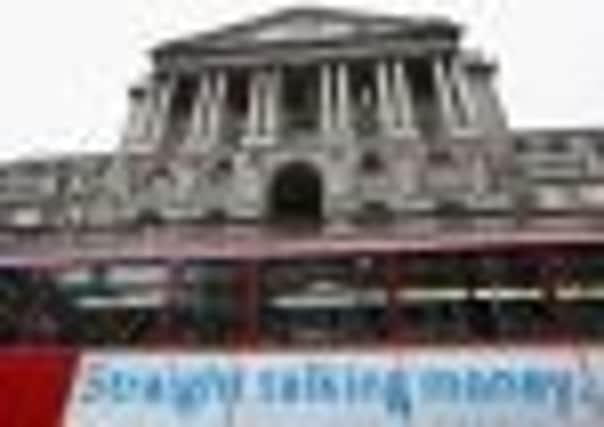Budget 2013: Opportunity missed to sort out finances


George Osborne had been expected to use his Budget speech to tweak the way the Bank’s monetary policy committee (MPC) keeps consumer prices under control, with some analysts even suggesting he might scrap its inflation target in a bid to boost the economy.
While he confirmed the inflation target would remain at 2 per cent, Mr Osborne gave the central bank room to loosen monetary policy by giving it the freedom to explore “unconventional” measures.
Advertisement
Hide AdAdvertisement
Hide AdOutgoing governor Sir Mervyn King said he supported the changes, but Haig Bathgate, chief investment officer at Turcan Connell Asset Management, said the apparent increase in flexibility merely “made formal what has been the Bank’s unofficial policy for some time”.
The pound rose against the dollar during the Budget speech as markets had feared Mr Osborne would unveil something akin to the US Federal Reserve’s “dual mandate”, which tasks it with keeping inflation and unemployment in check when setting interest rates. Investec economist Philip Shaw said: “That could really have opened the taps to more quantitative easing (QE), so we saw a big rally in sterling and gilts.”
Since March 2009, the Bank has ploughed £375 billion into the economy through QE, under which it buys government bonds from financial institutions. The policy is aimed at increasing growth but has been blamed for pushing up inflation and reducing bond yields, hitting pensioners’ incomes. Mr Bathgate said: “It’s quite clear QE has not been working – banks have just been using the money to shore up their balance sheets.”
Minutes of the MPC’s most recent meeting, also published yesterday, showed it remained split over the merits of money printing, with Sir Mervyn outvoted again in pressing for a £25bn extension to the QE programme.
The meeting, held on 6 and 7 March, was the second month in a row that Sir Mervyn – who will be succeeded by Canadian central banker Mark Carney in July – was joined by Paul Fisher and David Miles in voting to lift asset purchases to £400bn.
However, the other six members were unconvinced, as inflation remains above the 2 per cent target and more QE could push it higher.
Yesterday’s minutes said: “It might also lead to an unwarranted depreciation of sterling if it were misinterpreted as a lack of commitment to maintaining low inflation in the medium term.”
Official figures released on Tuesday showed consumer price inflation rose to a nine-month high of 2.8 per cent in February. The Bank forecasts it will rise above 3 per cent later this year, and will not return to its 2 per cent target until early 2016.
Advertisement
Hide AdAdvertisement
Hide AdCentral banks would normally raise interest rates to keep inflation under control, but the MPC has held the base rate at its record low of 0.5 per cent for four years amid fears that raising the cost of borrowing would choke off any recovery.
The Bank teamed up with the Treasury last year to launch the £80bn Funding for Lending scheme (FLS), which offers discounted funds to banks, providing they pass on the benefits to households and businesses in the form of cheaper loans.
Mr Osborne said yesterday he was “actively considering” a possible extension to FLS, an announcement welcomed by Mr Bathgate, who said the scheme was a “very good idea that hasn’t been working to date”.
He added: “To be fully effective it will require more confidence on the part of the consumer to borrow.”
MIXED BAG
Britain will escape a triple-dip recession by eking out growth of 0.1 per cent this quarter, according to the independent tax and spending watchdog.
However, the Office for Budget Responsibility (OBR) halved its growth forecast for the year as a whole to 0.6 per cent.
The economy is expected to grow by 1.8 per cent next year, which is down from the 2 per cent predicted by the OBR in December, before increasing to 2.3 per cent in 2015.
Howard Archer, chief UK and European economist at IHS Global Insight, said: “The growth forecast for 2013 looks entirely realistic, but we have doubts that the economy can achieve the projected expansion rates from 2014 onwards.”
He added: “We suspect that the economy will struggle to grow by more than 1.5 per cent in 2014.”